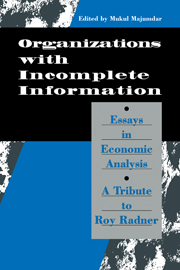Book contents
- Frontmatter
- Contents
- List of Contributors
- Preface
- Introduction: Searching for Paradigms
- 1 Equilibrium with Incomplete Markets in a Sequence Economy
- 2 The Existence of Rational Expectations Equilibrium: A Retrospective
- 3 Rational Expectations and Rational Learning
- 4 Dynamic Games in Organization Theory
- 5 The Equilibrium Existence Problem in General Markovian Games
- 6 A Practical Person's Guide to Mechanism Selection: Some Lessons from Experimental Economics
- 7 Organizations with an Endogenous Number of Information Processing Agents
- 8 A Modular Network Model of Bounded Rationality
- Index
4 - Dynamic Games in Organization Theory
Published online by Cambridge University Press: 09 October 2009
- Frontmatter
- Contents
- List of Contributors
- Preface
- Introduction: Searching for Paradigms
- 1 Equilibrium with Incomplete Markets in a Sequence Economy
- 2 The Existence of Rational Expectations Equilibrium: A Retrospective
- 3 Rational Expectations and Rational Learning
- 4 Dynamic Games in Organization Theory
- 5 The Equilibrium Existence Problem in General Markovian Games
- 6 A Practical Person's Guide to Mechanism Selection: Some Lessons from Experimental Economics
- 7 Organizations with an Endogenous Number of Information Processing Agents
- 8 A Modular Network Model of Bounded Rationality
- Index
Summary
Introduction
In any but the smallest human organizations, no one person has all of the information relevant to the organization's activities, nor can he directly control all of those activities. This is so even in organizations that are described as highly “centralized.” It follows that individual members of the organization – I shall call them agents – have some freedom to choose their own actions. If, in addition, there is some divergence among the agents' goals or objectives, then one can expect some inefficiencies to arise in the organization's operations. The analysis of these inefficiencies, and the possible remedies by means of organizational design, is the subject of this chapter.
If the behavior of the agents is rational in the sense typically used by economists and decision theorists, then the appropriate formal model would appear to be the theory of games, especially games of incomplete information, as developed in the past two decades. This is the methodology that I shall use here, although some aspects of “bounded rationality” will be touched on during the course of my exposition. Furthermore, the relationships among members of an economic organization are typically long-lived, calling for an analysis of dynamic games.
Two special paradigmatic models have arisen in the game-theoretic analysis of organization. In the first, which I have elsewhere called a partnership, the agents act together to produce a joint outcome (output, profit). This outcome can be observed by the agents, but they cannot directly observe each other's actions, nor do they completely share each other's information. In the most general – and realistic – case of this model, the outcome is also influenced by random variables that are only partially observed, if at all.
- Type
- Chapter
- Information
- Organization with Incomplete InformationEssays in Economic Analysis: A Tribute to Roy Radner, pp. 110 - 158Publisher: Cambridge University PressPrint publication year: 1998
- 1
- Cited by



